Please use this identifier to cite or link to this item:
https://doi.org/10.21256/zhaw-20307Full metadata record
| DC Field | Value | Language |
|---|---|---|
| dc.contributor.author | Wade-Bohleber, L.M. | - |
| dc.contributor.author | Böker, H. | - |
| dc.contributor.author | Grimm, S. | - |
| dc.contributor.author | Gärtner, M. | - |
| dc.contributor.author | Ernst, J. | - |
| dc.contributor.author | Recher, D.A. | - |
| dc.contributor.author | Buergi, N. | - |
| dc.contributor.author | Seifritz, E. | - |
| dc.contributor.author | Richter, A. | - |
| dc.date.accessioned | 2020-07-27T08:22:59Z | - |
| dc.date.available | 2020-07-27T08:22:59Z | - |
| dc.date.issued | 2020 | - |
| dc.identifier.issn | 0165-0327 | de_CH |
| dc.identifier.issn | 1573-2517 | de_CH |
| dc.identifier.uri | https://digitalcollection.zhaw.ch/handle/11475/20307 | - |
| dc.description.abstract | Background Depression and the experience of early adversity are associated with impairments in interpersonal and social cognitive functioning. The neural mechanisms involved in these impairments remain insufficiently understood. Methods In a sample of 48 depressed and 50 healthy participants, we explored seed-to-voxel functional connectivity (FC) during the recall of formative relationship episodes using functional magnetic resonance imaging. Results While depressive symptoms were associated with increased FC of brain regions that form an introspective socio-affective network, such as the precuneus, bilateral anterior insula, dorsal anterior cingulate cortex, left amygdala, and medial prefrontal cortex, early adversity linked to decreased FC of brain regions mediating emotion processing such as the bilateral anterior insula and increased FC of the bilateral parahippocampal gyrus. Limitations We report both results that are corrected for the number of seeds tested in FC analyses using strict Bonferroni adjustments and unadjusted results as part of an exploratory analysis. Discussion Our findings suggest that depression and early adversity are associated with differential FC patterns in the brain during the recall of formative relationship episodes. Hyperconnectivity of an introspective socio-affective network associated with depressive symptoms may link to enhanced self-focus and emotional reactivity. Patterns of neural activation associated with early adversity may underpin numbed affective states or enhanced affective memory regulation. Overall, these findings inform about the neural underpinnings of a reflective ability that is predictive of the adaptation to depression and to early adversity and relevant for psychotherapy outcomes. | de_CH |
| dc.language.iso | en | de_CH |
| dc.publisher | Elsevier | de_CH |
| dc.relation.ispartof | Journal of Affective Disorders | de_CH |
| dc.rights | http://creativecommons.org/licenses/by-nc-nd/4.0/ | de_CH |
| dc.subject | Depression | de_CH |
| dc.subject | Early adversity | de_CH |
| dc.subject | Interpersonal functioning | de_CH |
| dc.subject | Social cognition | de_CH |
| dc.subject | Autobiographic memory retrieval | de_CH |
| dc.subject | Task-based functional connectivity | de_CH |
| dc.subject.ddc | 616.8: Neurologie und Krankheiten des Nervensystems | de_CH |
| dc.title | Depression is associated with hyperconnectivity of an introspective socio-affective network during the recall of formative relationship episodes | de_CH |
| dc.type | Beitrag in wissenschaftlicher Zeitschrift | de_CH |
| dcterms.type | Text | de_CH |
| zhaw.departement | Angewandte Psychologie | de_CH |
| zhaw.organisationalunit | Psychologisches Institut (PI) | de_CH |
| dc.identifier.doi | 10.1016/j.jad.2020.05.110 | de_CH |
| dc.identifier.doi | 10.21256/zhaw-20307 | - |
| zhaw.funding.eu | No | de_CH |
| zhaw.originated.zhaw | Yes | de_CH |
| zhaw.pages.end | 534 | de_CH |
| zhaw.pages.start | 522 | de_CH |
| zhaw.publication.status | publishedVersion | de_CH |
| zhaw.volume | 274 | de_CH |
| zhaw.publication.review | Peer review (Publikation) | de_CH |
| zhaw.webfeed | Klinische Psychologie | de_CH |
| zhaw.author.additional | No | de_CH |
| zhaw.display.portrait | Yes | de_CH |
| Appears in collections: | Publikationen Angewandte Psychologie | |
Files in This Item:
| File | Description | Size | Format | |
|---|---|---|---|---|
| 2020_Wade-Bohleber-etal_Depression-recall-formative-relationship-episodes_JAD.pdf | 2.28 MB | Adobe PDF |  View/Open |
Show simple item record
Wade-Bohleber, L. M., Böker, H., Grimm, S., Gärtner, M., Ernst, J., Recher, D. A., Buergi, N., Seifritz, E., & Richter, A. (2020). Depression is associated with hyperconnectivity of an introspective socio-affective network during the recall of formative relationship episodes. Journal of Affective Disorders, 274, 522–534. https://doi.org/10.1016/j.jad.2020.05.110
Wade-Bohleber, L.M. et al. (2020) ‘Depression is associated with hyperconnectivity of an introspective socio-affective network during the recall of formative relationship episodes’, Journal of Affective Disorders, 274, pp. 522–534. Available at: https://doi.org/10.1016/j.jad.2020.05.110.
L. M. Wade-Bohleber et al., “Depression is associated with hyperconnectivity of an introspective socio-affective network during the recall of formative relationship episodes,” Journal of Affective Disorders, vol. 274, pp. 522–534, 2020, doi: 10.1016/j.jad.2020.05.110.
WADE-BOHLEBER, L.M., H. BÖKER, S. GRIMM, M. GÄRTNER, J. ERNST, D.A. RECHER, N. BUERGI, E. SEIFRITZ und A. RICHTER, 2020. Depression is associated with hyperconnectivity of an introspective socio-affective network during the recall of formative relationship episodes. Journal of Affective Disorders. 2020. Bd. 274, S. 522–534. DOI 10.1016/j.jad.2020.05.110
Wade-Bohleber, L.M., H. Böker, S. Grimm, M. Gärtner, J. Ernst, D.A. Recher, N. Buergi, E. Seifritz, and A. Richter. 2020. “Depression Is Associated with Hyperconnectivity of an Introspective Socio-Affective Network during the Recall of Formative Relationship Episodes.” Journal of Affective Disorders 274: 522–34. https://doi.org/10.1016/j.jad.2020.05.110.
Wade-Bohleber, L. M., et al. “Depression Is Associated with Hyperconnectivity of an Introspective Socio-Affective Network during the Recall of Formative Relationship Episodes.” Journal of Affective Disorders, vol. 274, 2020, pp. 522–34, https://doi.org/10.1016/j.jad.2020.05.110.
Items in DSpace are protected by copyright, with all rights reserved, unless otherwise indicated.